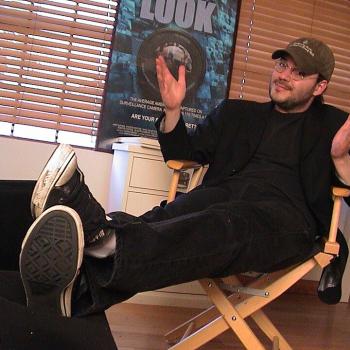
A few weeks ago I chanced upon a video interview with a real, live Appalachian family affected by inbreeding—right down to being sheltered and protected by the local community. My first thought was “I thought that was just a movie trope.” My next: “I think I’m going to swear off hill people incest gore porn for a while.” Way too sad and humanizing to do anything else. Tropes can take a beating; people less so.
Though I put off watching it for a long time because I dumbly assumed it would be dumb, I like Texas Chainsaw Massacre (1974) as much as the next guy (goes to show not to take advice from me). I think I saw the remake of The Hills Have Eyes (2006) at one of those middle school sleepovers where everyone falls asleep in front of the TV with buttery popcorn fingers—at least one kid having eaten some rank fridge concoction (that kid, of course, is not sleeping happily in front of the TV). Ah memories. But I was done-zo. Fini. Ganz fertig.
And then along came Tobe Hooper’s The Funhouse (1981). As someone who spent a year in clown therapy as a kid [after running out of 102 Dalmatians (2000) in the second grade]—movies about carnivals, clownery, and make-up besmeared japes are always a bit of a challenge for me. But I do love a little self-overcoming—and so I found one of the better “hill people films”—whodathunkit?
The Funhouse has a basic plot. The young Joey Harper (Shawn Carson) decides to fake combo platter Mike Myers-Norman Bates his sister, Amy (Elizabeth Berridge), scaring her half to death, and leading to her swearing revenge. Her chance for cold-blooded teenage payback comes fast: she says she won’t be taking Joey to the carnival tonight. Their father warns her not to go there on her date with local gas station attendant, Buzz (Cooper Huckabee). It turns out it’s the same carnival that, the previous year, had been in a nearby town just when two bodies were found. But Amy is a teenage dirtbag, lies (says she’s off to the movies), and splits for the carnival with Buzz and another couple, Miles and Liz (Richie Atterbury and Largo Woodruff). They smoke some pot, walk around, and decide (like some friends before them) to spend the night in the funhouse (double entendre fully and unapologetically intended). Unfortunately, through the floor, they happen to see a man in a Frankenstein mask (Wayne Doba) pay the show’s fortuneteller (Sylvia Miles) for sex. When he finishes too quickly and she refuses to refund the money, the guy turns on her and kills her. The kids decide to get away, but not before Miles stops in the room and steals the carnival’s nightly earnings. Bad idea. The family who runs the show quickly realizes something is wrong; havoc ensues as we learn that the Frankenstein fella is actually the deformed son of the owner who keeps (mistakenly?) leaving bodies in his wake (not unlike the original Frankenstein’s monster). Meanwhile, Joey has escaped the house and wandered over to the carnival—you can guess where things go from there (this thing ain’t reinventing the wheel).
Hooper leads us along at the perfect pace. It isn’t until about 40 minutes in that we even realize they plan to spend the night in the funhouse; up to then, we just get a general sense of eeriness from what is otherwise a normal carnival (which isn’t to say those can’t be, uh, eerie in their own way). Up to that point, I assumed the whole thing was going to be more typical—kids start getting picked off, maybe its some grossly deformed, sex-craved carnies, just doing what they know best. But that’s not it at all—Hooper takes things slowly and never fails to humanize the carnival folk. They don’t kill for the thrill of it; these teenagers stole into their funhouse then stole their money, after all. The mutant son, though he may have translucent skin, red eyes, and fangs—is ultimately as much a tragic figure as anything else (if Rambo just wanted a sandwich, he just wanted intimacy). Even his movements seem, while ghoulish, so slow as to suggest a kind of lethargy and unwillingness. The weird carnie family is like any other (even if their rotten apple is a flesh-eating beast). Mensch heißt Mensch, as the old Herbert Grönemeyer song goes.













